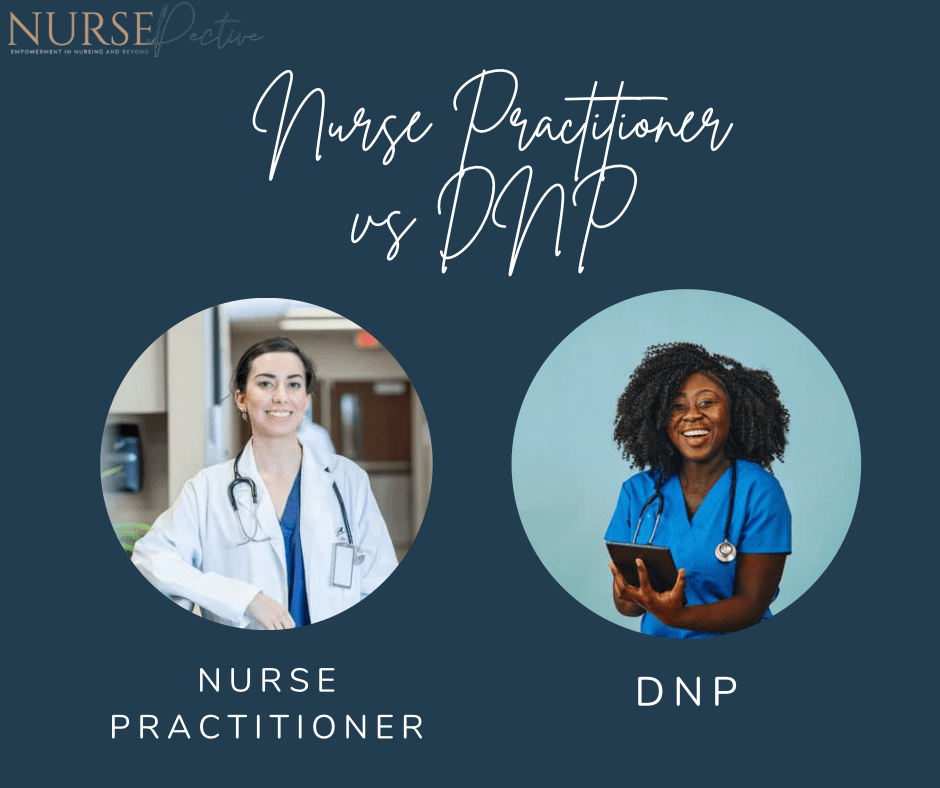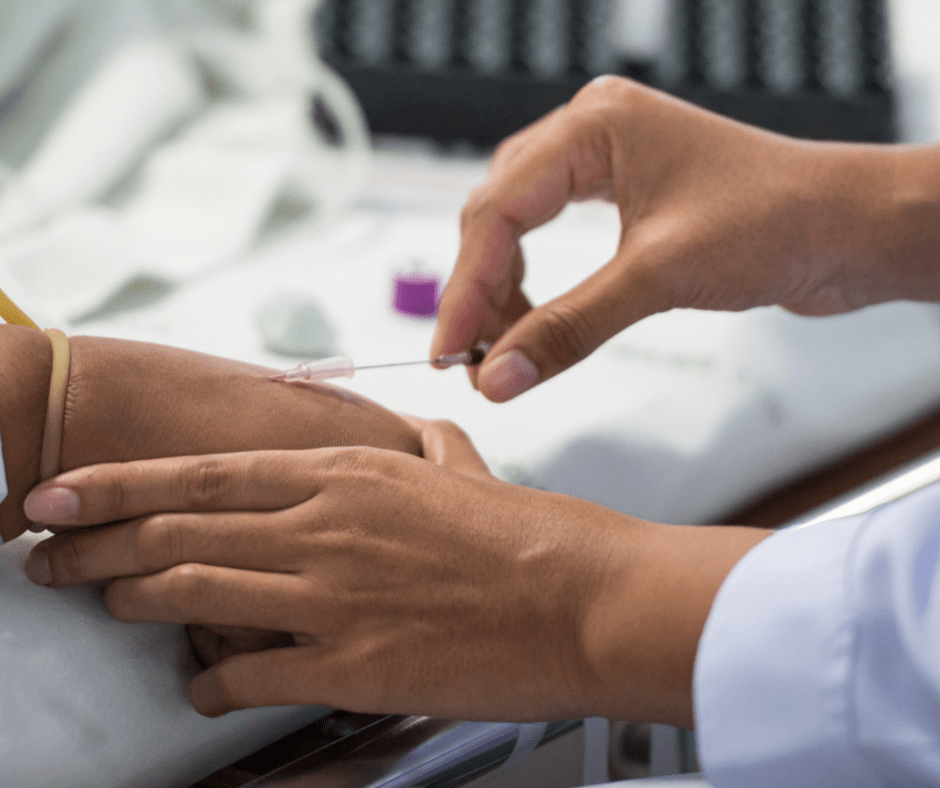
When you are a nurse practitioner, you have a lot of responsibilities. You have to make sure that your patients are healthy and that they stay healthy.
That involves a lot of different things: diagnosing and treating infections, making sure people are getting the right medications and treatments for their conditions, educating them about their conditions, and much more.
But what if you could do all of that AND also get a doctorate in nursing? That's right—you could be a doctor AND a nurse. It's like being two awesome people at once!
But what does it take? How do you become a DNP (Doctor Of Nursing Practice)? And how is it different from being an NP (Nurse Practitioner)?
Let's find out together!
Definition Of Nurse Practitioner (NP)

A nurse practitioner (NP) is a registered nurse with advanced education and training in a specific area of healthcare, such as pediatrics, psychiatry, or adult care.
NPs provide primary and specialty care services, including diagnosing and treating illnesses, ordering and interpreting diagnostic tests, and prescribing medications.
They work in collaboration with physicians and other healthcare professionals to provide patient-centered, high-quality care.
Definition Of Doctor Of Nursing Practice (DNP)

The Doctor of Nursing Practice (DNP) is the highest level of education for a nurse. It is a professional doctorate degree in nursing that prepares nurses for leadership roles in healthcare delivery, education, research, and policy development.
The DNP curriculum focuses on advanced clinical practice, evidence-based practice, leadership, and healthcare systems management. Graduates with a DNP degree are equipped with the skills and knowledge necessary to provide the highest level of patient care and improve healthcare outcomes.
They may work in various settings, including hospitals, clinics, private practices, and academia.
Education And Training
1. How to Become a Nurse Practitioner?

To become a nurse practitioner, you must follow the below steps:
1) get a Bachelor Of Science In Nursing
The Bachelor of Science in Nursing (BSN) is a four-year degree program that prepares you to be a registered nurse.
The BSN prepares you for a career in patient care and gives you the skills and knowledge needed to succeed as an RN. The Bachelor of Science in Nursing degree also allows students to pursue graduate studies at the master's level.
2) earn a Registered Nurse Licensure
The requirements to become a Registered Nurse (RN) in the US vary by state, but they are generally similar.
Most states require that you have a high school diploma or GED, although some will accept an Associate's degree or higher. Most require that you have specific clinical experience in a hospital setting before taking the national licensing exam (NCLEX-RN).
3) get Master Of Science In Nursing
The next step is to complete an advanced degree program in nursing, either a Master of Science in Nursing (MSN) or a Doctor of Nursing Practice (DNP).
These programs typically take 2-3 years to complete and include coursework in advanced clinical practice, pharmacology, healthcare systems management, and leadership.
4) obtain your State Licensure
Finally, NPs must obtain a license to practice in their state by meeting requirements such as passing a state-specific certification examination and completing continuing education courses.
2. How to Become a DNP ?

1) Enroll into Bachelor Of Science In Nursing (BSN)
In order to pursue a Doctor of Nursing Practice degree, you must first have a bachelor's degree in nursing (BSN).
It's important that you choose an accredited school so that your degree will be recognized by employers.
2) earn a Registered Nurse Licensure
After that, you will need to pass the NCLEX-RN exam, which is the national licensing exam for registered nurses. This test is administered by the National Council Licensure Examination, Inc. (NCLEX-RN).
Once you have passed your licensing exam, you will need to apply for your license with your state's licensing board.
3) GEt into Master Of Science In Nursing (MSN)
The Master of Science in Nursing (MSN) degree is an advanced practice nursing program. Students seeking this degree must have a bachelor's degree, a license as a registered nurse, and current cardiopulmonary resuscitation (CPR) certification.
4) Get Into Doctor of Nursing Practice (DNP) program
Individuals must then complete a DNP program, which typically takes 2-3 years of full-time study.
The program includes coursework in advanced clinical practice, healthcare systems management, healthcare policy, and leadership.
5) Complete your Clinical Hours
Clinical hours are required for the DNP degree. These hours will be completed in an approved clinical setting and provide a unique opportunity to apply the knowledge gained in the classroom to actual patient care.
Clinical hours must be supervised by a clinical or teaching faculty member and documented on the official DNP record.
6) Dissertation
A DNP program culminates in a capstone project or dissertation, which demonstrates the individual's ability to contribute to the field of nursing through research or a practice improvement project.
Role And Responsibilities
NP Responsibilities

The responsibility of nurse practitioners includes:
1) Assessing Patients
The NP is responsible for assessing patients and determining the severity of their condition.
This includes making sure that the patient's condition is safe enough for them to return home, as well as determining what other resources are needed to keep the patient healthy.
2) Prescribing Medicines
The NP prescribes medications, which are drugs that help with health problems. NPs work with patients to figure out the best course of treatment, whether it's over-the-counter or prescription.
They also may write prescriptions for their patients, but they can't prescribe more than what's allowed by their state laws.
3) Maintaining Patient Records
Maintaining patient records is an important part of the NP’s job. NPs need to be able to maintain and update patient records, including physical examinations, medical histories, lab results, and other diagnostic tests.
This information is used by the NP in order to make decisions about the health of their patients. They also use this information when communicating with other healthcare providers about their patient’s care needs.
4) Documenting Patient Care
The purpose of documentation is to provide a clear and accurate record of the care you have provided to your patients.
Documentation provides a detailed history of the patient's condition and progress throughout the course of treatment.
It is an important tool for communication between healthcare professionals and other members of the healthcare team.
DNP Responsibilities

The DNP responsibilities includes:
1) Conducting Research
Conducting research is one of the most important roles of a DNP. A nurse practitioner's role is to provide comprehensive and continuous care for patients, which requires them to keep up-to-date on medical developments and advances in treatment options.
A DNP must have strong academic and clinical skills, along with a commitment to lifelong learning. They must be able to manage their own time effectively, as well as supervise other nurses who report to them.
2) Leading In Healthcare Administration
The DNP is a degree that is designed for healthcare professionals who want to become leaders in their field. It is not just a doctorate, but also a doctorate in nursing practice, which means that the coursework and research will be focused on nursing.
There are many different specialties within nursing, so the DNP allows students to focus on their interests without having to take unrelated classes.
3) Mentoring And Educating Others
DNP candidates are expected to exercise mentorship and educational responsibilities as they progress through their programs.
They must demonstrate the ability to apply their knowledge and skills in various clinical situations, including assessments, diagnosis, management, and treatment planning.
They also have an obligation to teach others by providing clinical supervision and teaching others appropriate clinical practices.
Salary And Job Outlook
NP Salary And Job Outlook

Nurse Practitioners (NP) are advanced practice registered nurses who provide primary and specialty healthcare services.
The average salary for NPs varies depending on factors such as location, type of employer, years of experience, and specialty.
In the United States, the median annual salary for NPs was reported to be around $118,040 in May 2021.
The job outlook for NPs is very positive, with a projected job growth rate of 40% from 2021 to 2031, much faster than the average for all occupations.
The demand for NPs is expected to increase as the healthcare industry continues to grow and the population ages, leading to an increased need for healthcare services.
Additionally, NPs are able to provide a high level of care, making them an attractive option for healthcare organizations looking to improve patient outcomes and reduce costs.
DNP Salary And Job Outlook

The median annual salary for a nurse practitioner with a Doctor of Nursing Practice (DNP) degree is around $109,000, according to Payscale.com.
The exact salary for a DNP nurse practitioner can vary based on several factors, such as location, years of experience, and the specific field or specialty.
The job outlook for nurse practitioners, including those with a DNP, is positive, with employment expected to grow much faster than the average for all occupations, according to the BLS.
The increasing demand for healthcare services, particularly from an aging population, is a major factor driving the demand for nurse practitioners.
Additionally, the trend towards interdisciplinary, patient-centered care is also increasing the demand for advanced practice nurses like DNP-prepared nurse practitioners.
Key Differences Between NP And DNP

The main differences between a Doctor of Nursing Practice (DNP) and a Master of Science in Nursing (MSN) with a focus on Nurse Practitioner (NP) are as follows:
- Degree level: The DNP is a doctoral degree, while the NP is a master's degree.
- Focus: The DNP has a broader focus on healthcare systems and policies, while the NP program focuses more on patient care and diagnosis.
- Practice authority: DNPs may have more autonomy and independence in practice compared to NPs, depending on state laws and regulations.
- Coursework: The DNP program includes more advanced coursework in healthcare systems and leadership, while the NP program focuses on advanced clinical skills.
- Career opportunities: A DNP degree may lead to more advanced leadership and administrative roles in healthcare, while an NP degree provides more direct patient care opportunities.
It's important to note that specific requirements for NP and DNP programs can vary by state and institution.
Key Similarities Between NP And DNP

Both the Doctor of Nursing Practice (DNP) and the Nurse Practitioner (NP) programs prepare registered nurses to become advanced practitioners in the field of nursing. However, despite the differences in titles, there are several key similarities between the two programs.
- Focus on patient-centered care: Both the DNP and NP programs place a strong emphasis on patient-centered care, which is a holistic approach to healthcare that prioritizes the needs, preferences, and values of the patient. This approach ensures that healthcare decisions are made with the patient's well-being in mind rather than just the treatment of their medical condition.
- Evidence-based practice: Both the DNP and NP programs emphasize the importance of evidence-based practice, which is the integration of the best available research evidence with clinical expertise and patient values to make healthcare decisions. This approach helps to ensure that healthcare decisions are based on the most up-to-date and reliable information available.
- Clinical practice: Both the DNP and NP programs require clinical practice as a key component of their curricula. This allows students to gain hands-on experience working with patients and applying the concepts they have learned in the classroom to real-world situations.
- Advanced knowledge: Both the DNP and NP programs provide students with advanced knowledge in a wide range of topics, including health assessment, diagnosis, treatment planning, and patient management. This knowledge is essential for providing high-quality, patient-centered care.
- Leadership skills: Both the DNP and NP programs emphasize the importance of leadership skills for advanced practitioners. This includes skills such as effective communication, team management, and the ability to work collaboratively with other healthcare professionals.
Conclusion
This is a tough choice. Both Nurse Practitioners and DNP degree holders are highly qualified, and they bring a lot of value to their organizations. However, the nurses who have gone through and earned the DNP degree have more clinical experience than their counterparts who have only earned an NP degree.
The best thing you can do is to consider your career goals and decide which route will best help you reach them.
FAQs About Nurse Practitioner vs DNP
1. Do DNP get paid more than NP?
A DNP (Doctor of Nursing Practice) is a higher degree than NP (Nurse Practitioner). Generally, DNP holders get paid more than NP holders. This is because DNP requires higher education with more clinical experience and advanced practice skills than NP.
DNP programs also include coursework in research, leadership, health policy, and healthcare delivery systems.
With these additional qualifications, DNP holders are qualified for better job opportunities that come with higher salaries.
Furthermore, some employers may offer a signing bonus or other incentives to recruit DNP practitioners.
Therefore, due to the extra specialization and expertise, they bring to the table, DNPs often earn more than NPs in similar.
2. Can DNP write prescriptions?
The answer to the question "Can DNP write prescriptions?" is yes. Doctor of Nursing Practice (DNP) is a terminal professional degree that prepares nurses to serve in advanced practice roles.
As part of their advanced practice role, DNPs are able to prescribe medications and other treatments. The regulations vary based on the state, but generally speaking,
DNPs can write prescriptions for all medications within their scope of practice. This includes both generic and brand-name drugs, as well as over-the-counter medications when appropriate.
In addition to writing prescriptions, DNPs also have the authority to order diagnostic tests and provide medical advice to patients.






